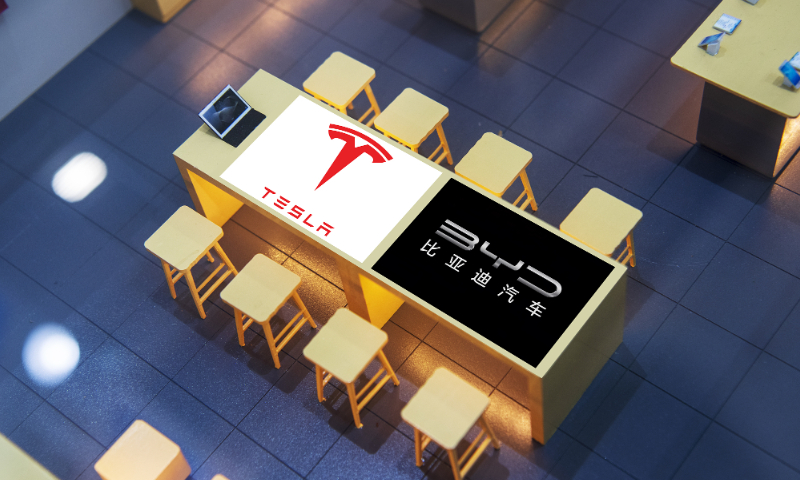
Photo: VCG
Tesla has released its Q4 2023 delivery and production results, beating market estimates and meeting its 2023 target. Despite this outstanding performance, certain Western media outlets, after comparing it to China's BYD, have adopted a sour grapes mentality and sensationalized the news with headlines such as "BYD overtakes Tesla for the first time."
Data indicates that Tesla's electric vehicle sales remained the highest globally in 2023, but its Q4 sales were surpassed by BYD. BYD electric vehicles demonstrated very strong growth momentum, with sales increasing more than 70 percent compared to 2022. The comparison of data between the two companies from China and the US has triggered a sense of crisis in Western media, not only within the electric vehicle industry but also in the entire economic and technological sectors. Reuters even claimed in its headline "BYD steals top EV spot." These reactions reflect a narrow-minded mentality when facing China's development.
However, they fail to mention another set of comparisons. In 2023, Tesla's annual sales of electric vehicles reached 1.8 million units, with sales in the Chinese market alone exceeding 600,000 units, and Tesla's Shanghai factory delivered a total of 947,000 vehicles. This means that one-third of Tesla's electric cars sold globally in the whole year were purchased by Chinese consumers, and more than half were manufactured at the Shanghai factory. This is a story of an American company benefiting from China's development.
Let's take a look at BYD's experience in the US. Due to concerns about the so-called "spy buses," the US government once interfered with the normal production of BYD's American bus factory in the form of a ban. Regarding exports of BYD electric cars to the US market, the US, through measures like the Inflation Reduction Act, has set insurmountable barriers. This is a real story of a Chinese company being shut out by the US through despicable means.
Even more ironic is that the US government is still discussing further increasing tariffs on Chinese electric vehicles. This is essentially Washington's plan of "targeting imaginary enemies." As the US market hardly imports electric cars from China, this means that the US government is planning to tax a product that fundamentally does not exist in the country. Some American officials said that this is because they are worried that despite the numerous barriers in place, they will still be unable to prevent Chinese electric vehicles from entering the US. The fact that they are so alarmed by even a single electric vehicle shows how conservative and fragile the overall mentality in Washington is. Not only do they build the wall higher, but they also lack the courage to stick their heads out and take a look.
In stark contrast, on December 22 last year, Tesla signed a land transfer contract in Shanghai and announced the official launch of the Tesla Shanghai Energy Storage Super Factory project. The Chinese media reported this development with a positive and welcoming tone. China did not redirect its anger toward American companies like Tesla despite the US government's suppression and exclusion of Chinese companies. Instead, China opened its doors to Tesla, and Tesla has gained substantial benefits by embracing the Chinese market. It is the Americans who feel resentful about BYD overtaking Tesla. Is there any valid reason for them to complain?
It is worth mentioning that BYD, after being forced to give up the US market, has still become the world's leading electric vehicle manufacturer. China's journey of winning the race in the electric vehicle industry over the past decade proves that isolation is not the way forward, and progress can only be achieved through opening-up. Western public opinion often distorts competition as confrontation, while neglecting the aspect of win-win cooperation. For the entire industry, in a mature and orderly market environment, competition in technology and cost-effectiveness as well as the pursuit for creating higher quality products for consumers could lead to a healthy and positive ecosystem, which does not necessarily have to be a zero-sum game of "you lose, I win." Chinese people are happy about BYD's progress and also hope to see Tesla's continued success.
The Pacific is large enough to accommodate the development of both China and the US; the world itself is even bigger, offering infinite possibilities for the future. Every country, nation, and enterprise has its own space and opportunities. Many problems arise from the narrow-mindedness of some Western elites who cannot tolerate even a company like BYD. They treat what is supposed to be a positive story as a horror story, fabricating elements of anxiety and concern, and concocting the "China electric vehicle threat theory" that has quietly emerged in Europe and the US. When a Chinese industry temporarily encounters difficulties, they badmouth it; when it develops well, they say it is a threat. Fortunately, their actions are mainly causing discomfort for themselves, and China's progress will not be hindered by them.




